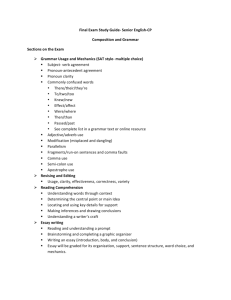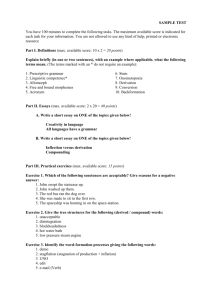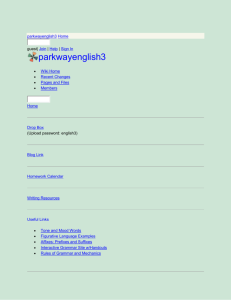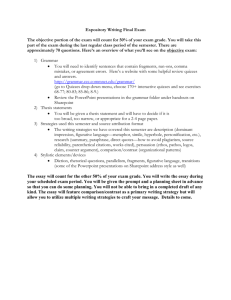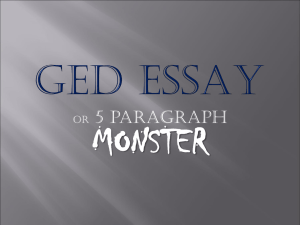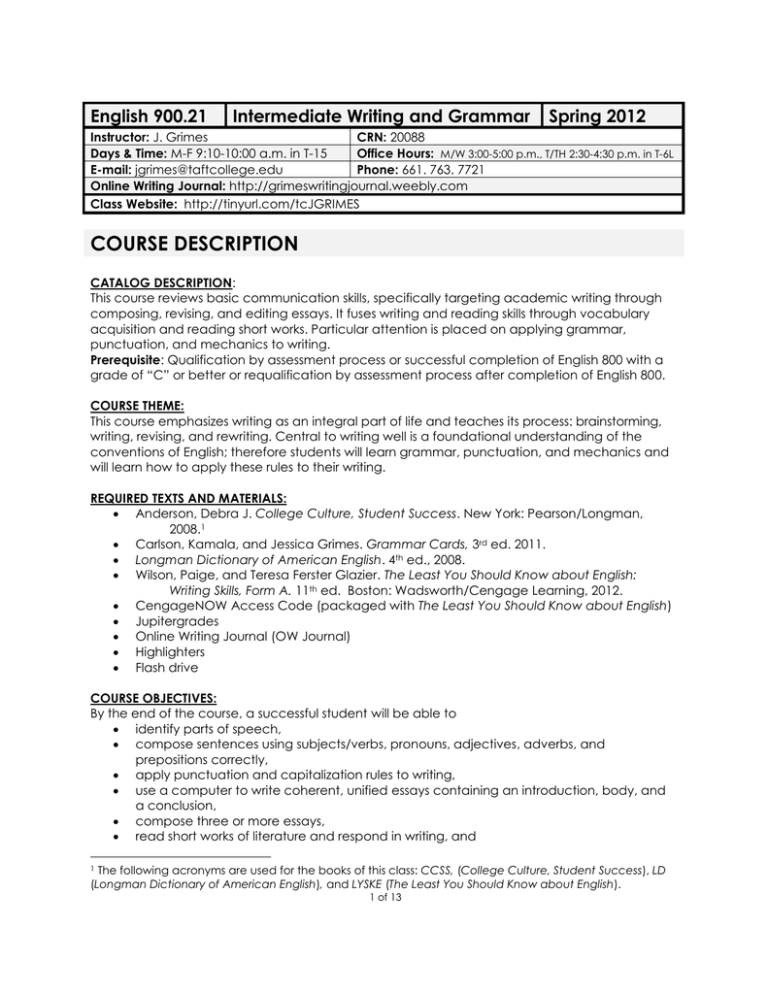
English 900.21
Intermediate Writing and Grammar
Spring 2012
Instructor: J. Grimes
CRN: 20088
Days & Time: M-F 9:10-10:00 a.m. in T-15
Office Hours: M/W 3:00-5:00 p.m., T/TH 2:30-4:30 p.m. in T-6L
E-mail: jgrimes@taftcollege.edu
Phone: 661. 763. 7721
Online Writing Journal: http://grimeswritingjournal.weebly.com
Class Website: http://tinyurl.com/tcJGRIMES
COURSE DESCRIPTION
CATALOG DESCRIPTION:
This course reviews basic communication skills, specifically targeting academic writing through
composing, revising, and editing essays. It fuses writing and reading skills through vocabulary
acquisition and reading short works. Particular attention is placed on applying grammar,
punctuation, and mechanics to writing.
Prerequisite: Qualification by assessment process or successful completion of English 800 with a
grade of “C” or better or requalification by assessment process after completion of English 800.
COURSE THEME:
This course emphasizes writing as an integral part of life and teaches its process: brainstorming,
writing, revising, and rewriting. Central to writing well is a foundational understanding of the
conventions of English; therefore students will learn grammar, punctuation, and mechanics and
will learn how to apply these rules to their writing.
REQUIRED TEXTS AND MATERIALS:
Anderson, Debra J. College Culture, Student Success. New York: Pearson/Longman,
2008.1
Carlson, Kamala, and Jessica Grimes. Grammar Cards, 3rd ed. 2011.
Longman Dictionary of American English. 4th ed., 2008.
Wilson, Paige, and Teresa Ferster Glazier. The Least You Should Know about English:
Writing Skills, Form A. 11th ed. Boston: Wadsworth/Cengage Learning, 2012.
CengageNOW Access Code (packaged with The Least You Should Know about English)
Jupitergrades
Online Writing Journal (OW Journal)
Highlighters
Flash drive
COURSE OBJECTIVES:
By the end of the course, a successful student will be able to
identify parts of speech,
compose sentences using subjects/verbs, pronouns, adjectives, adverbs, and
prepositions correctly,
apply punctuation and capitalization rules to writing,
use a computer to write coherent, unified essays containing an introduction, body, and
a conclusion,
compose three or more essays,
read short works of literature and respond in writing, and
The following acronyms are used for the books of this class: CCSS, (College Culture, Student Success), LD
(Longman Dictionary of American English), and LYSKE (The Least You Should Know about English).
1
1 of 13
integrate the following transitions in writing: as a result, because, consequently, due to,
however, in addition to, in contrast, likewise, similarly, therefore, whenever, while.
COURSE SLOs:
At the end of the course, a successful student will be able to do the following:
compose and revise essays according to the conventions of MLA format,
identify and correct grammatical and mechanical errors in written work, and
use new vocabulary accurately in written work.
COURSE POLICIES:
Plagiarism completely undermines the learning process. Taft College defines plagiarism as “any
illegitimate act by any student, such as plagiarism or falsifying documents that would gain that
student an advantage in grading, graduating from the college, or qualifying for entrance into
any academic program” (Student Handbook 125). Any form of cheating, whether it is
appropriating someone’s work or allowing others to use your work, is not acceptable. A student
will receive a zero for the assignment, and other disciplinary measures may be taken depending
on the severity of the offense.
Attendance: You are expected to be punctual and attend all class sessions. Four absences will
result in being dropped from the course. Tardiness or leaving class early will not be tolerated. If a
student is chronically tardy or chronically leaves class early three times, s/he may be dropped
from the class. If you plan to be absent, notify me ahead of time by telling me, preferably in
person, but contacting me via email or telephone is acceptable so that accommodations can
be made. Failure to attend class will result in missing important competencies and mini-lectures
that are pre-requisites for passing the class; therefore it is imprudent to be late, unless an
emergency prevents him/her from attending class on time. You are expected to organize
outside commitments or appointments to avoid interference with class time. This means that
outside commitments should be carefully evaluated before making a semester-long
commitment. Since the course covers a voluminous amount of material that requires in-class
participation, your attendance will affect your performance in the class. In order to be a
successful student, attendance is mandatory.
Late Work and Late Work Passes2: Every student will have two Late Work Passes (LWPs) to only use
for late papers. No other assignments will be accepted late, except papers. Once the passes
are used, late papers will not be accepted. Therefore, it would be advisable to use those passes
carefully in case of an unexpected emergency.
If one chooses to use the Late Work Pass, he can turn in the assignment a day later for a
ten percent grade drop on the assignment. As days pass, the percentage dropped on the
assignment will increase by ten percent for each late day. For example, if an assignment is due
on Monday, and a student turns in the assignment on Wednesday, he or she will receive a thirty
percent grade drop on the assignment; however, if he or she turns in the assignment the day
after, the assignment will be dropped by ten percent.
2
Late Work Pass abbreviated
2 of 13
Writing Assignments: Writing is recursive, meaning a process of pre-writing, drafting, revising, and
rewriting. Clear, coherent writing requires practice in and out of class. Each time an essay is due,
students will write a rough draft, conference with the teacher, and revise it for the final draft.
Each outside essay must include a ROUGH DRAFT and a FINAL DRAFT to be considered
complete. In order for your final draft to be accepted and graded, students must compose a
rough draft. Without a rough draft, final drafts will not be graded. All outside essays must be
double-spaced, typed, and in Times New Roman font or the equivalent. This means that I WILL
NOT ACCEPT an essay, rough or final draft, that has been handwritten. Failure to comply with this
rubric for outside essays will result in a grade penalty.
Revisions: After a student turns in the final essay and receives a grade, she or he may revise it up
to ten percent provided it is done before the next essay or test is due. A revision must be
comprehensive, meaning that merely revising grammatical and mechanical errors will not result
in a significant grade change if the content remains virtually the same. A student who chooses
to revise must conference with the instructor first before rewriting. Additionally the student must
include a typed explanation of how he or she revised the essay.
Academic Success: Research indicates that academic success stems from a variety of factors;
among these factors, such as studying, completing work, and participating in class, meeting
with the instructor during office hours increases a student’s understanding of the material. It is
therefore, highly recommended that in addition to meeting with the instructor for writing
conferences which are mandatory, that each student meet with the instructor as often as
possible. Office hours are listed above; however, if a student needs to meet at another time, I
am more than happy to schedule an appointment.
Mandatory Writing Lab Hours (Library): Each student must spend four hours in Taft College’s
Writing Lab, and one hour with a tutor or SI working on a paper. To receive credit for scheduling
a tutoring session, you must ask for the tutor/SI’s signature. The mandatory four hours in Taft
College’s Writing Lab must be completed by May 4th. Since you will have several writing
assignments, an online journal to work on, and CengageNOW, it is recommended that you work
on these assignments.
Online Writing Journal (OW): The journal is a blog: http://grimeswritngjournal.weebly.com. Each
student will write short quickwrites responding to College Culture, Student Success (CCSS), which
will be read in and outside class. The online journal portion of it will be used to extend ideas and
skills learned from the class. In addition to responding to the posted question on the online
writing journal, you will also respond to at least one student’s comment. Since your posts will be
on-line, it is important to maintain online etiquette by following these rules:
1). Identify who you are, your first and last name, to avoid confusion.
2). Include the title of the short essay in your response.
3). When responding to a student’s comment, stay on topic. Even if you disagree, don’t
disparage the other student.
4). Avoid negative or disparaging comments. Do not use expletives (“cuss words”).
5). Do not post any information unrelated to the quickwrite. All personal information
should be reserved for your personal Facebook account, not the class account.
Journal responses must be posted by the end of the week to receive credit to receive credit.
Late responses will not be accepted.
3 of 13
CengageNOW: All grammar homework will be completed online at CengageNOW where you
have ten chances to master a lesson before taking the post-test. Exercises will coincide with
grammar lessons learned in class. Use LYSKE to practice lessons and to check your answers in the
back of the book. In order to receive credit, complete the exercises before the due date on the
syllabus and receive 80% or better on the pre-test or post-test. The first half of the exercises (1-8)
are due March 12th while the second half are due one week before the final on May 9th
(exercises 9-16). In your textbook LYSKE, you will find an access code to register online. Use the
following directions to access CengageNOW:
1). Go to http://login.cengagebrain.com.
2). Click on “Create an Account”.
3). Enter your “Access Code” in the textbook LYSKE.
4). Enter your account information; accept the “License Agreement”; confirm
your age, and click “Continue”.
5). Select “US” and “Taft College” under “Search”; then click “Register”.
6). Continue to CengageNOW, and click “Resources”.
7). Key in the Course Key Code-E-5WJ75EHSDS8T3.
E-mail Requirement: All students are required to provide a working e-mail address for updates.
Check your e-mail twice a week for updates. All students should have an account provided by
the school by the end of the first week. If you need to email me, be professional and use
academic language. All emails should include the following: a subject in the subject line; the
date; a greeting (Ms. Grimes); a clearly written message without text, slang, or profanity; and a
proper closing (Sincerely, Your Name). If you don’t have an account, then contact Technology
Services at 763. 7797, and they will provide you with an e-mail address.
Appropriate Behavior: To avoid unnecessary interruptions, cell phones need to be turned off.
A cell phone is turned OFF when there isn’t a ring tone, whether it’s on vibrate or a melody, and
it’s impossible to text message. If emergencies occur, where use of the cell phone is necessary,
notify me before class, and answer your cell phone OUTSIDE class.
Unless working in groups or engaged in a class discussion, please refrain from engaging in
conversations unrelated to class discussion. Consulting other materials, including textbooks from
other classes or leisure books/magazines during class is strictly prohibited, and I reserve the right
to confiscate materials that distract from the learning process.
Tutors and Supplemental Instructor Assistants (SIs): Tutors and Supplemental Instructors are
available to assist you in your studies. You may visit them in the library for further assistance.
Statement on Disabilities: Students with disabilities who believe they may need accommodations
in the class are encouraged to contact Supportive Services at 763. 7841 or 763. 7927, as soon as
possible to better ensure such accommodations are implemented in a timely fashion.
GRADE SUMMARY:
ASSIGNMENTS
In-Class Practice
OW Journal & Presentations
Mandatory Writing Lab (Library)
WORD COUNT
POINTS
LYSKE Practice
25 points
OW Journal-50, Presentations-50
100 points
5 hours (4 - Writing Lab, 1 - tutor/SI)
50 points
4 of 13
WBI & VGAa (AWLb) Vocabulary
10 assignments
50 points
LYSKE Homework
CengageNOW (online)
100 points
Diagnostic Essay
250-500 words 1-2 pages
25 points
Rough Draft of Essay #1
500-750 words or 2-3 pages
25 points
Final Essay #1
500-750 words or 2-3 pages
75 points
Rough Draft of Essay #2
500-750 words or 2-3 pages
25 points
Final Draft of Essay #2
500-750 words or 2-3 pages
75 points
Rough Draft of Essay #3
500-750 words or 2-3 pages
25 points
Final Draft of Essay #3
500-750 words or 2-3 pages
75 points
Rough Draft of Essay #4
500-750 words or 2-3 pages
50 points
Final Draft of Essay #4
500-750 words or 2-3 pages
150 points
50 - Midterm/100 - Final
150 points
10 competencies (10 points/each)
100 points
Exams (2)
Competencies
TOTAL POINTS
1100 points
aWrite
by Imitation
b Academic Word List
GRADE RUBRIC FOR PAPERS:
GRADE
REQUIREMENTS
A
Superior paper: clear response to topic, coherent, virtually free of sentence-level errors,
and demonstrates above-average control of mechanics and diction.
B
Good paper: clear response to the topic, but may show problems with paragraph
structure, minimal sentence-level errors, and average control of mechanics and diction.
C
Average paper: responds to the topic, reasonably organized (although some
inconsistency) with sufficient paragraph structure, some sentence-level errors, and
acceptable control of mechanics and diction.
D
Incompetent paper: limited or repetitive response to assignment, disorganized and lacking
transitions, a variety of sentence-level errors, awkward mechanics and diction.
F
Incomplete paper: confused response to assignment, disorganized and weak paragraph
structure, sentence-level errors obscure the meaning of essay, confused mechanics and
diction.
GRADE SCALE
Letter Grade
Percentage
A+ to A100-90
B+ to B89-80
C+ to C79-70
5 of 13
D to DF to F-
69-60
50-0
Complaints/Questions Regarding Grades: If a student has a question regarding a grade, follow
the protocol outlined below:
1). Allow 24 hours before speaking to the instructor about the assignment.
2). Make an appointment with the instructor and come to the instructor’s office hours to
discuss the complaint BEFORE the next paper/test is due.
3). After a week, the student may not make a complaint about the grade.
4). The student must explain why the grade was unmerited and bring the original
assignment sheet showing where he/she adhered to the rubric.
5). If the student’s grade was wrong, then the instructor will revise the grade
appropriately. If the student received a fair grade but would like to try for a better grade,
s/he may revise it as long as it is turned in BEFORE the next paper/test is due. If the
subsequent paper is better than the first, then I will average the first and second paper,
and the student will receive the average. If the subsequent paper is worse than the
previous paper, then the student will receive the better of the two grades.
I ____________________________ understand the syllabus and what is expected of me. I agree to
comply with the policies and rules outlined in the syllabus. I agree to follow the conditions
outlined for each assignment and understand the penalties for not complying. In addition, if I
have a complaint, I agree to follow the protocol to resolve any issues that I might have
regarding grades.
“Learning never exhausts the mind.” –Leonardo da Vinci
6 of 13
Dictionary Use and
Spelling
Writing: Paragraph and
Essay Development
Introduction to the
Course
Learning Outcomes
WEEK 1
Monday
January 16
Tuesday
January 17
Wednesday
January 18
Thursday
January 19
Friday
January 20
WEEK 2
Monday
January 23
Tuesday
January 24
Wednesday
January 25
Thursday
January 26
Friday
January 27
WEEK 3
Monday
January 30
Tuesday
February 31
Wednesday
February 01
Thursday
February 02
Friday
February 03
In-Class Work (Bring the appropriate book.)
Outside Homework (CengageNOW.)
MARTIN LUTHER KING, JR. HOLIDAY
Syllabus Overview, Online Writing Lab, Diagnostic Essay,
Introduction to CengageNOW
Introducing the Essay (Anatomy of an Essay Grammar Card),
Dissection of an Essay Grammar Card, Writing Prompts
(Paraphrasing)
The Writing Process: pre-writing, writing, and revising
Writing Prompts (Paraphrasing)
Lab Day- Syllabus Competency, CengageNOW
Registration, Jupitergrades, Introductory Paragraph (HIT)
Buy books (LYSKE, CCSS, LD), highlighters, and a onesubject notebook/journal.
Introductory Paragraph (Thesis Statements), Anatomy of
an Essay Grammar Card
Body Paragraphs (TECT) and Transitions, Anatomy of an
Essay Grammar Card and Transitions Grammar Card
Competency 2, Body Paragraphs (Evidence and
Commentary) Anatomy of an Essay Grammar Card and
Transitions Grammar Card
Concluding Paragraph (HS), Anatomy of an Essay
Work on the thesis statement, body paragraphs,
concluding paragraphs; then revise the practice inclass essay.
Transitions
Register on CengageNOW using the access code.
CengageNOW assignments open.
Grammar Card
Lab Day- Completing the Essay, MLA Format of an
Essay/Paragraph Grammar Card
Grading the Essay: Rubric, OW Journal, Editing Checklist
Grammar Card
Quickwrites, Using the Dictionary LD viii-ix, Diction:
Clichés, Awkward Phrasing, and Wordiness 145-7
Affixes LD A42-43, Academic Word List (AWL) and
Writing Paragraphs WBI
Words Often Confused 1, LYSKE 4-8, Competency 2
Lab Day- Words Often Confused 2, LYSKE 14-17
CCSS Online Writing Journal and WBI due on Friday
CengageNOW:
Words Often Confused
Grammar: Subjects and
Verbs
Grammar: Parts of
Speech
Grammar and
Writing: Paragraph
and Essay
Development
WEEK 4
Monday
February 06
Tuesday
February 07
Wednesday
February 08
Thursday
February 09
Friday
February 10
WEEK 5
Monday
February 13
Tuesday
February 14
Wednesday
February 15
Thursday
February 16
Friday
February 17
WEEK 6
Monday
February 20
Tuesday
February 21
Wednesday
February 22
Thursday
February 23
Friday
February 24
Contractions LYSKE 36-37
Possessives LYSKE 42-43
Essay 1 Handout, Work on the outline Anatomy of an
Essay Grammar Card and Transitions Grammar Card,
Competency 3, Work on the outline, Anatomy of an
Essay Grammar Card and Transitions Grammar Card
Lab Day- Work on the rough draft Anatomy of an Essay
Grammar Card and Transitions Grammar Card, Rough Drafts of
Essay 1 Due
Rough Draft Conferences
Parts of Speech LYSKE 22-27
Parts of Speech LYSKE 22-27
Parts of Speech Contd.
Finish the outline. Work on the outline and paper.
CCSS Online Writing Journal and VGA due Friday
CengageNOW:
Words Often Confused
Contractions and Possessives
LAST DATE TO DROP WITHOUT A “W” (2/13)
CCSS Online Writing Journal and WBI due Friday
Revise the Rough Draft.
CengageNOW:
Words Often Confused
Contractions and Possessives
Parts of Speech
HOLIDAY
HOLIDAY
Final Drafts of Essay 1 due, Finding Subjects & Verbs
LYSKE 63-65, Prepositional Phrases LYSKE 69-70
Competency 4, Finding Subjects & Verbs LYSKE 63-65,
Prepositional Phrases LYSKE 69-70
Subject-Verb and Prepositional Phrase Posters
Lab Day- Subject-Verb and Prepositional Phrase Posters
CCSS Online Writing Journal and VGA due Friday
CengageNOW:
Words Often Confused
Contractions and Possessives
Parts of Speech
Subjects and Verbs
Work on posters.
WEEK 7
Grammar: Verbs
Grammar & Writing:
Paragraphs and Essay
Development
Grammar
Grammar: Run-ons,
Comma Splices,
Fragments
Monday
February 27
Tuesday
February 28
Wednesday
February 29
Thursday
March 01
Friday
March 02
WEEK 8
Monday
March 05
Tuesday
March 06
Wednesday
March 07
Thursday
March 08
Friday
March 09
WEEK 9
Monday
March 12
Tuesday
March 13
Wednesday
March 14
Thursday
March 15
Friday
March 16
WEEK 10
Dependent and Independent Clauses LYSKE 75-77
Dependent and Independent Clauses LYSKE 73-79
Fragments LYSKE 82-84, Complete Sentences Grammar Card
Fragments LYSKE 82-84, Comma Splices and Run-ons
LYSKE 89-91 Complete Sentences Grammar Card,
Comma Splices and Run-ons LYSKE 89-91 Complete
Sentences Grammar Card,
Lab Day- Fragments, Run-ons, Comma Splices Review
Work on the outline and paper.
CCSS Online Writing Journal and WBI due Friday
CengageNOW:
Words Often Confuse
Contractions and Possessives
Parts of Speech
Subjects and Verbs
Fragments
Run-ons
REMINDER—CengageNOW Exercises DUE March 12th
Essay 2 Handout, Work on the outline. Anatomy of an
Essay Grammar Card and Transitions Grammar Card
Grammar and Writing Review, Work on the outline. Anatomy
of an Essay Grammar Card and Transitions Grammar Card
Grammar and Writing Review, Work on the outline. Anatomy
of an Essay Grammar Card and Transitions Grammar Card
Grammar and Writing Review, Work on the outline. Anatomy
of an Essay Grammar Card and Transitions Grammar Card
Lab Day- Competency 5 Rough Drafts of Essay 2 Due
Study for the midterm; revise rough drafts.
CCSS Online Writing Journal and VGA due Friday
CengageNOW (DUE March 12th):
Words Often Confused
Contractions and Possessives
Parts of Speech
Subjects and Verbs
Fragments
Run-ons
Verb Tenses
Rough Draft Conferences
Revise rough drafts. Work on the Food Inc. packet. WBI
due Friday
Midterm
Identifying Verb Phrases 97-98, Regular and Irregular
Verbs LYSKE 109-113
Introduction to Food, Inc.
Lab Day- Introduction to Food, Inc., Final Draft of Essay 2
Grammar: Pronouns
Grammar: Verbs
Monday
March 19
Tuesday
March 20
Wednesday
March 21
Thursday
March 22
Friday
March 23
WEEK 11
Monday
March 26
Tuesday
March 27
Wednesday
March 28
Thursday
March 29
Friday
March 30
Competency 6, “Organic Farming Harms the Environment
and Threatens Human Health” Argument
“Organic Produced Food Improves Human, Animal, and
Environmental Health” Counterargument
Work on the outline and handouts.
Revise the paper.
CCSS Quickwrites
Essay 3 Handout, work on the outline, debate
Work on the outline
Lab Day- Rough Drafts of Essay 3 Due, Work on the
outline
Food Wars Presentation Handout, Rough Draft
Conferences
Work on oral presentation, paper, Anatomy of an Essay
Grammar Card and Transitions Grammar Card
Work on oral presentation, paper, Anatomy of an Essay
Grammar Card and Transitions Grammar Card
Work on oral presentation, paper, Anatomy of an Essay
Grammar Card and Transitions Grammar Card
Lab Day- Oral Presentations
LAST DATE TO DROP WITH A “W” (3/26)
VGA due Friday
Revise the paper.
Work on the oral presentation.
Grammar: Sentence
Types
SPRING BREAK APRIL 2-6
WEEK 12
Monday
April 09
Tuesday
April 10
Wednesday
April 11
Thursday
April 12
Friday
April 13
WEEK 13
Subject-Verb Agreement LYSKE 119-121
Using Pronouns LYSKE 155-159
Competency 7, Using Pronouns Contd. LYSKE 153-161
Shifts in Person 163, Recognizing Verbal Phrases
(Gerunds, Infinitives, Participles) LYSKE 128-129
Final Drafts of Essay 3 Due, Recognizing Verbal Phrases
(Gerunds, Infinitives, Participles) LYSKE 128-129
WBI due Friday
CengageNOW:
Pronouns A-B
Subject-Verb Agreement
Grammar: Review
Writing: Paragraph
and Essay
Development
Punctuation Rules
Monday
April 16
Tuesday
April 17
Wednesday
April 18
Thursday
April 19
Types of Sentences: Simple, Complex, Compound,
Complex-Compound
Types of Sentences: Simple, Complex, Compound,
Complex-Compound, Sentence Patterns
Sentence Patterns
Friday
April 20
WEEK 15
Monday
April 23
Tuesday
April 24
Wednesday
April 25
Thursday
April 26
Friday
April 27
WEEK 16
Monday
April 30
Tuesday
May 01
Wednesday
May 02
Thursday
May 03
Friday
May 04
WEEK 17
Monday
Lab Day-Sentence Review
VGA due Friday
CengageNOW:
Pronouns A-B
Subject-Verb Agreement
Sentences A-B
Sentence Patterns
Period-Dash LYSKE 168-169, Punctuation Grammar Card
Comma Rules I LYSKE 175-176, Punctuation Grammar Card
Comma Rules II LYSKE 182-184, Punctuation Grammar Card
Quotation Marks, Underlining, and Italics LYSKE 190-191,
Punctuation Grammar Card
Lab Day- Competency 8, Capital Letters LYSKE 196-197,
Punctuation Grammar Card
Essay 4 handout, Grammar/Punctuation Presentation
Handout, Grammar Cards
Work on Grammar/Punctuation Presentation. Grammar Cards
WBI due Friday
CengageNOW:
Pronouns A-B
Subject-Verb Agreement
Sentences A-B
Commas
Punctuation
Quotation Marks
Rough Draft of Essay 4 due Work on Essay outline.
Grammar and Writing Review, Grammar Cards
Work on the grammar/punctuation presentation, the
outline, and the essay.
CengageNOW (DUE May 9th):
Pronouns A-B
Subject-Verb Agreement
Sentences A-B
Commas
Punctuation
Quotation Marks
Capitalization
Rough Draft Conferences, Grammar Cards
Study for the final exam.
Competency 9, Work on Grammar/Punctuation
Presentation. Grammar Cards
Grammar/Punctuation Presentation, Grammar Cards
May 07
Tuesday
May 08
Wednesday
May 09
Thursday
May 10
Friday
May 11
Revise the essay.
Competency 10, SLO Assessment, Grammar Cards
Grammar and Writing Review, Grammar Cards
NO CLASS
Final Drafts of Essay 4 due, Final Exam, 11:00-2:00 a.m.
The SYLLABUS MAY CHANGE; IF IT DOES, IT WILL BE UPDATED AND GIVEN TO YOU.


